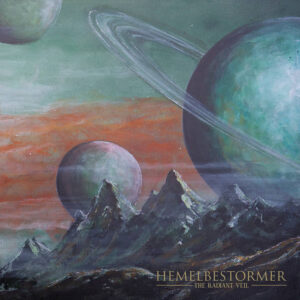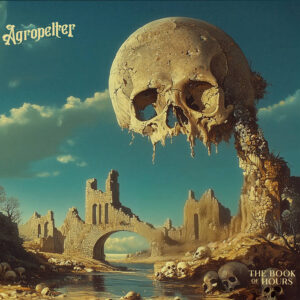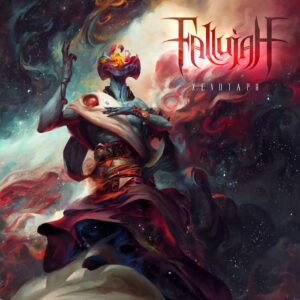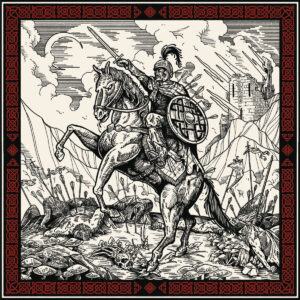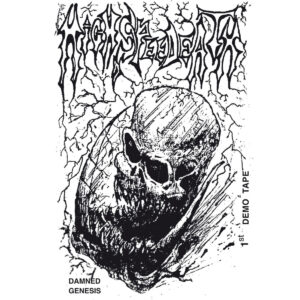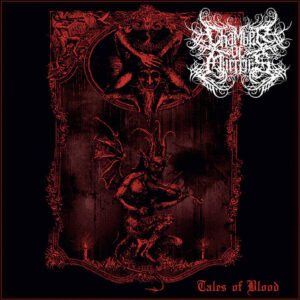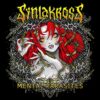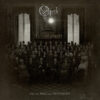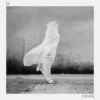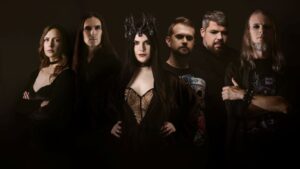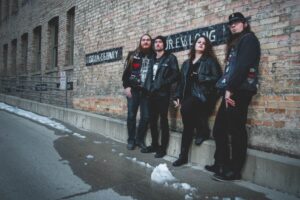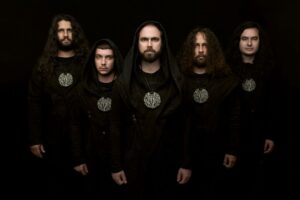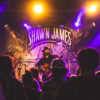Andreas Huber
Vermocracy
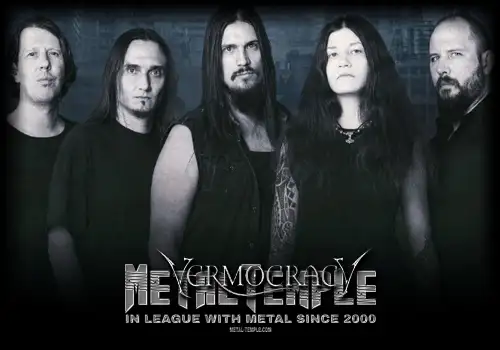
Hi, Thanks for the invitation! I think, we'll answer this first question in detail during the interview.
Generally speaking, our music and lyrics refer to different aspects of humanity in a pessimistic way. Reading the news, looking back in history, drawing conclusions for the future, or just exploring our innermost – Reality offers a plenty of content we use as a blueprint for our images.
Ironically, I used the word dysphoric for some of the working process in our last interview . But the pandemic was definitely not the main reason for the choice of the albums name and its content.
The first album was released at the beginning of 2020. Retrospectively, this was not the best idea but nobody in this world saw this coming. We didn't have a release show and no opportunity to promote the album live. Nevertheless, it helped a lot to get the attention of some labels. At this time, we already had about 2 and a half new songs and we decided to record 3 demo songs. We were very excited when Black Sunset MDD showed interest and decided to record a second album. From this point on, there was no way back.
For me personally, the songwriting process was really hard because my life during the lock-downs mostly consisted of home-office, beer and bad news. All sources of inspiration like personal contacts, rehearsals, concerts, gigs etc. were gone from one day to another.
Fortunately, Stella, my guitar and songwriting counterpart, provided plenty of riffs and song ideas we could work out and I'm quite satisfied with the result.
Everyone had his/her own challenges to deal with. The most difficult time was when even rehearsals where prohibited. It's quite hard to explain a musical idea sending around GuitarPro files or writing emails. We are all friends and need the exchange musically and personally. My greatest fear was that one of us (including myself) will give up. But we survived and are planning to go further.
First, I have to mention that this word is a medical term and means something like the opposite of euphoria. The end? The question is for whom or what, when and how you define the end. As far as I know, this planet will exist for about another 5 billion years. Regarding humanity - There are so many challenges mankind is confronted with like the environment, wars, the rise of authoritarian thinking, the believe in eternal economic growth, technology developing faster than societies can cope with etc. OK - that was somehow chaotic but that were the first things in a long list that immediately came to my mind. What I can definitely say is that there will be major changes within the next years and decades and I'm not very optimistic about that.
The pandemic was a perfect example how easy societies can be split into two groups. There was a lot of dogmatism, instrumentalisation and misinformation poisoning the public discourse. I'm really glad that this seems to be over for the moment.
My personal feeling is that societies (or democracies) with large inequalities have the tendency to slip into authoritarian systems. I see wealth and decadence on one side and poverty on the other. Public institutions like solidary social systems, health care, retirement plans or education are reduced, disestablished or privatized. This is the perfect breeding ground for totalitarian thinking and the next reactionary dazzler is standing in line telling the people what they want to hear, to push through his or her power-hungry agenda. But this not only applies to modern societies.
The difference in modern societies is that profit oriented companies and their algorithms are additionally adding fuel to the fire, creating needs and opinions for their own purpose. The fact that all kind of information is available at any time and everywhere speeds up this process.
I'm aware that there are so many other aspects I didn't mention or I don't even know about but more would go far beyond the scope of this interview.
We asked Armin Stocker, a good friend of us, if he would do our second album artwork at the time when we recorded the first 3 demo songs, which were Grace of Hypnos, World of Wounds, and Necrocracy, as far as I remember. I didn't ask him about his thoughts but retrospectively it fits the three songs perfectly. A damaged world, war and the wish for eternal sleep. Also, the continuation of the first artwork and the consequently ongoing decay of the protagonist's face seemed perfect to us. When I saw his first draft, I was shocked by its beauty, if we want to stick to this word.
From there on, it grew and got more detailed. The only thing we had to do was to choose the background colour, in the end. I can't thank this amazing artist enough for this perfect visual interpretation of our music.
I wouldn't say we are all doomed, despite we are all going to die at some point. I'd appreciate a better social order, but I don't have a clue how to realistically do that. Besides, trying to radically create a utopia is dangerous in my opinion.
On the first album, all songs were written by me with help of our drummer Roman within about 7 years. At the time, we were building up the band and it took a long time to find this perfect band line-up we are having, since the first album.
Naturally, all of us have different musical influences. The 90ies and early 2000s Melodic Death Metal is something that we agreed on, in the first place. When Stella joined, shortly before the recording our first album, a lot of her guitar playing, which is heavily riff based, was integrated into our music. Michael is a very versatile vocalist whose voice ranges from deepest growls up to Black Metal shrieks. Roman is definitely influenced by Iron Maiden and Hannes (Bass) started out in the late 80ies with old school Death Metal. We try to integrate every member's uniqueness, as good as possible. I hope, there will be some point where people say we sound like Vermocracy and not like anything else.
Riffs are definitely an important element used on this album but only riffs would be quite boring for us and our listeners. There is no particular initial vision besides getting rid of the chaos every new song brings, in the beginning. Maybe there's a recurrent theme we want to follow which is getting as much as possible out of our few instruments with hardly any artificial effects.
First of all, I'm very thankful to recognize how detailed you studied our music. I have my roots in Black Metal too and in my youth one of my favourite bands was Opeth. Not being an actual Black Metal band but using this element a lot. My personality sometimes demands to break out from this happy, diatonic Melodic Death sound. Harmonically, dis-harmonic elements like only moving around minor chords or using scales like halftone-wholetone scale can create great tension demanding release – depending on our mood, we either allow that release or not. From the rhythmical point of view, dark, two-voiced Black Metal shredding is one opportunity to break out from the excessive riffing you mentioned before.
One outlier on this album which serves some of those clichés is the last song called "In Darkness Let Me Dwell". It's a Death Metal interpretation of a John Dowland song, written for voice and lute in the early 17th century. Michael loves this kind of music and told me he would like to do a reinterpretation of this song. I liked the song and especially the lyrics, so I tried to put the song in a Death Metal context which was a big challenge, especially because musicians hardly were using bars, in this era. Lyrically, there was no need for change because none of us could ever write such hopeless and beautiful words like two unknown persons almost 400 years ago.
Normally, when it comes to the lyrics, the song is almost finished, instrumentally. In some cases, Michael has an association, meaning the lyrics are inspired by the song. In other situations, there is some content he wants to deliver and he applies it to the existing song. If needed, I write lyrics but they are just content to be refined by the vocalist. The first rhythmic integration of the lyrics is done by Michael because guitar players normally don't have a clue how to do that, or are just not interested in this kind of work.
For "Age of Dysphoria" Michael joined forces with his girlfriend Bettina Neustifter who is in fact a talented writer. She helped us to find the right words and to realise our lyrical ideas.
Yes, it's possible but as I mentioned before, it is very difficult without direct interaction, repetition, reflection and feedback. Furthermore, I needed some kicks up my ass by my bandmates to get active.
Before we bring a song to the rehearsal room, we have to write it down and practice, anyway. But that's just the instrumental part. We hardly had any opportunity to rehearse with vocals because we've finished the instrumentals shortly before the recordings. This led to some difficulties within the recording process because we didn't communicate all our ideas in advance. But that's just another lesson learned how to maintain band chemistry.
Musically: Grace of Hypnos and Necrocracy, Lyrically: Opposed evolution – I wrote the lyrics for this song – consequently, I sometimes can identify with them
It's not the first time we've played at the Escape Metalcorner but we've never had such an enthusiastic crowd. People were headbanging, moshing, screaming, holding up lighters and even dancing. Thanks to everyone who supported us that evening. Special thanks to our supporting bands namely:
Schänder (Klagenfurt, Austria)
Dismal Lumentis (Vienna, Austria)
and
Infest (Belgrad, Serbia)
We had a concert in Graz and the week afterwards in Klagenfurt. In December we have a show at a festival at the Escape Metalcorner, Vienna, again. We are planning to do some gigs outside Austria, next year.
I take this as a great compliment and, and thanks Lior for the interesting and Vermocracy related questions

More results...

